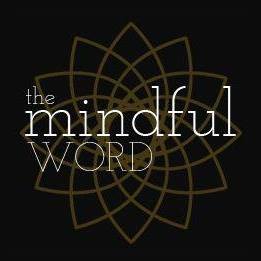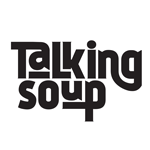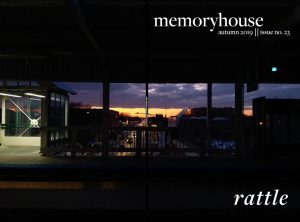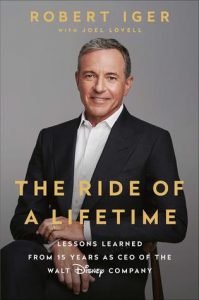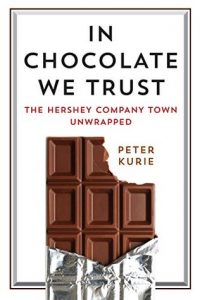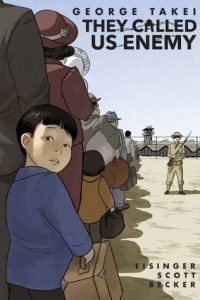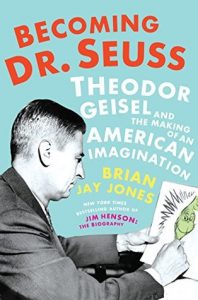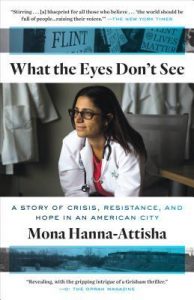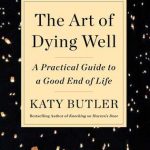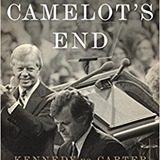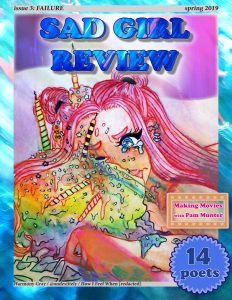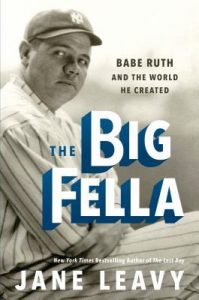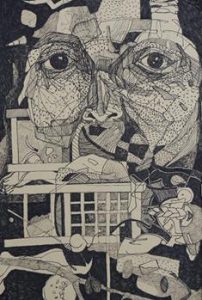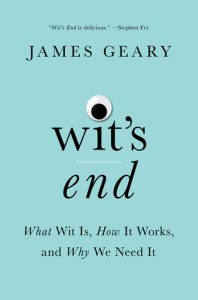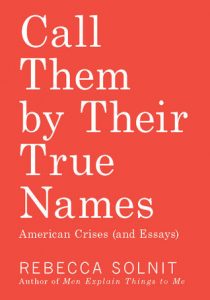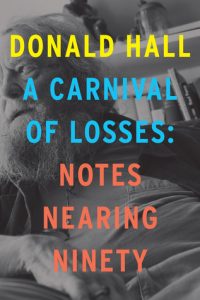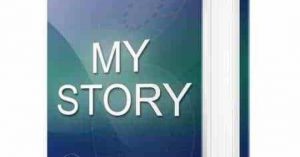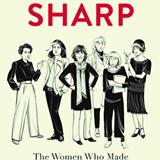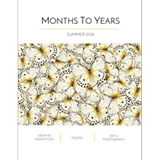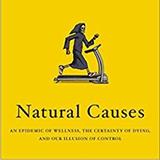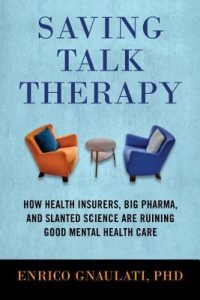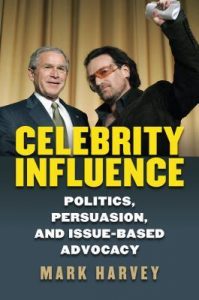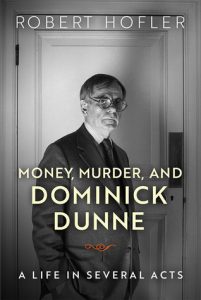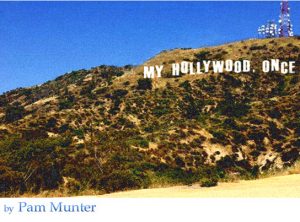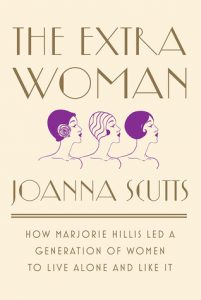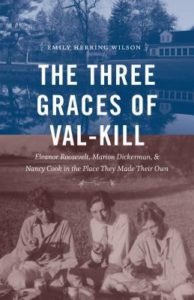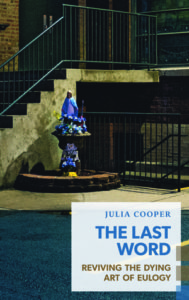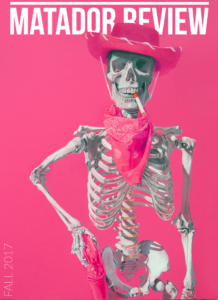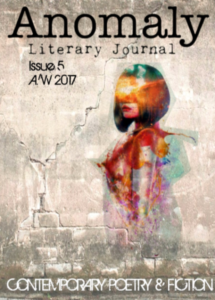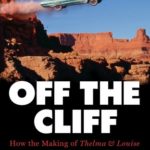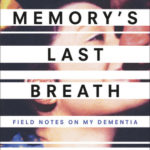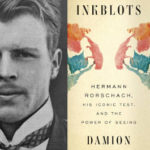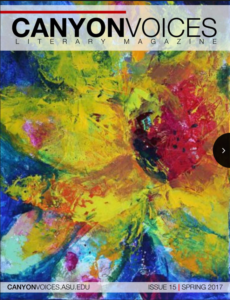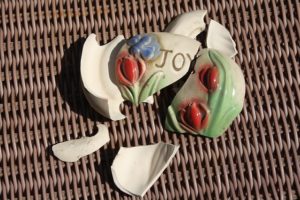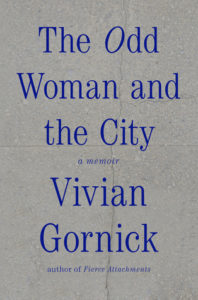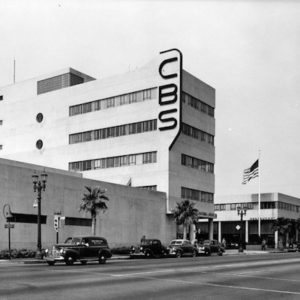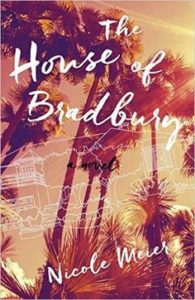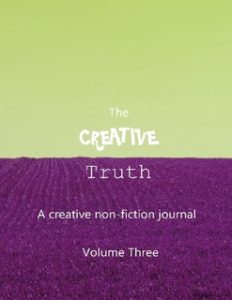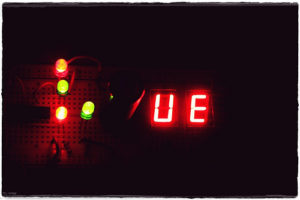Conversations On The Empty Bench
A place to collectively grieve and honor those who have died.
“Nana,” an essay
Nana,
It has been more than 65 years since you died. It wasn’t a surprise because I knew about all those strokes you’d been having. At 12, I wasn’t prepared for the unremitting grief. I was inconsolable for months. So, many years later, I wonder why we had that profound connect. You only lived with us until my brother was born when I was almost six, then saw each other only a couple of times a year. My parents would drop me off for a week in the summer at that big, white, two-story house in South Pasadena you shared with Aunt Mimi. We’d spend the days together when Mimi was at work. I remember we played “Fish” and listened to those saccharine radio dramas. My favorite times came when you’d play the piano. I’m inevitably moved to tears even now when I hear “The Blue Danube Waltz,” the one I always asked you to play. We didn’t fight but we didn’t talk much, either. What was it that made me feel safe and accepted?
“Belated Regret,” an essay, in The Dillydoun Review
It was the last emotion I expected upon exploring the voluminous genealogical document I had commissioned. I merely wanted to learn more about my family. With both of my parents long gone, I hoped this would provide tentative answers to the perplexing question many adult children have of their parents: Who were they beneath their parental poses? I hunted for them between the lines. In the process, I was momentarily sidetracked by some unfinished business with my mother.
bioStories: A literary magazine sharing the extraordinary in ordinary lives
An Essay: “My First Real Job” in bioStories
At twenty-one, few of us fully understand who we are yet, and that inevitable identity struggle was in full flower in 1964 in Boston. Surviving college was easy compared to juggling the existential weight of making the next big decision. It seemed so important, as if that first post-college job would set the course for the rest of my life. I was wrong about that. My first real job lasted all of four months.
https://biostories.com/recent-essays/
An essay: “Working Through Trouble”
Optimism has been in short supply in recent years, leaving many to struggle with anxiety and depression. Some have found relief from psychotropic drugs, but others have looked to one-on-one therapeutic interactions to bring them back to themselves. When these partnerships work well, the tools and insights learned during those sessions will last a lifetime
An Essay: “Lessons Learned: A Life in Under 2000 Words,” in Writing in A Woman’s Voice
If I were to be mugged, the newspaper reports would call me “elderly,” but most days I don’t feel like that. In some ways, I’m just getting started, even though I know the days “dwindle down to a precious few.” The upside is the sense of perspective over the course of a lifespan, the patterns, the growth and the trends. The goal has been to inhabit a life well-lived with lessons learned along the way. Here are a few of them.
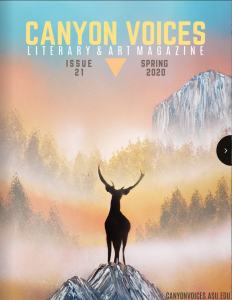
“Rosalie’s Reprise,” a play, in Canyon Voices
“Rosalie’s Reprise,” a one-act play about the aftermath of the suicide of a cabaret singer, an unconventional memorial held in the Oak Room of the Algonquin Hotel in New York City.
“If These Walls Could Talk,” a Hollywood fantasy, in Communicators League
It’s true. I’m not what I used to be. But, in spite of the years and the disheartening changes, I still stand proudly. Wouldn’t you? It’s not merely that I’ve been in daily use for 80 years. You can’t help but be impressed when you’ve watched all the famous and infamous people who have walked through my doors and the rich Hollywood history that was made here. And, oh, the secrets I could tell.
Part Two:
If These Walls Could Talk (Part 2) | by Pam Munter
“Gerry’s Interview,” a short story in Blue Lake Review
Some days, it’s hard for me to remember why I’m here. I know where I am. I’m here at Emerald Glen. I mean at this point in my life. First off, I need to tell you I never wanted to be a movie star. Momma drove me to my dancing and singing lessons. Picked me up right after school. She kept telling me how wonderful I was, how I was making her so proud. Nobody in Beatrice, Nebraska had ever been in movies, so I don’t know why she thought it would be me up there on the big screen. Oh, I had done community theater, church socials, you know. Typical small-town stuff. Big frog and all that.
“Finding Old Friends,” an essay on Talking Soup
Nostalgia can be a risky indulgence. For every warm and fuzzy memory, there’s an intrusive reminder of falling short, truncated relationships, and untethered emotion.
Essay: “Me and Doris,” in Memoryhouse https://chicagomemoryhouse.files.wordpress.com/2020/02/body_f19_rattle_spreads.pdf
When I was a little kid, I had a secret that I never told anyone. I was going to become a legend.
When I went to the movies or listened to records, I knew I could do that. It wasn’t until I went off to college that I discovered not everyone wanted to be a movie star. What was wrong with them, anyway?
Flash Nonfiction: “Amazon Adventure,” in Former People
There are very few benefits coming from the first days following open-heart surgery but one of them is that friends and family send flowers, cards and warm messages. Two days after coming home, a gorgeous bouquet of roses arrived from Amazon with no card, so I called to find out who sent them. Ten minutes and several explanations and reconnections later, I repeated my dilemma to a woman I could barely understand. She laughed after nearly every word. Following several attempts to get her to understand my Signal Corps, spell-lettering of the code, she demanded all my account info.
Book Review: “Nice Guys Finish First” – The Ride of a Lifetime by Robert Iger
You may not recognize the name, so why would you read a memoir about an unfamiliar business tycoon? We all know his employer. The Walt Disney Company is consistently rated by Forbes each year among the richest and most highly regarded companies. Entertainment industry insider Robert Iger has presided over its exponential growth and relatively scandal-free years, while shepherding its monumental acquisitions of Pixar, Marvel and Lucasfilms. What does it take to direct a huge corporation? And what’s the impact on the person? Readers seeking an introspective tome will be disappointed. It’s difficult to find the man behind the scenes.
Book Review: In Chocolate We Trust by Peter Kurie
The dawn of the 20th century intersected The Gilded Age, an era of escalating American entrepreneurial spirit, replete with untethered greed and rapacious business practices. Rockefeller, Carnegie, Ford and others amassed fortunes that would dwarf anything that had come before. They were urban dwellers, unlike Milton Hershey (b. 1857), who set up production of his pioneering chocolate plant on farm land in the middle of Pennsylvania. To avoid inevitable staffing difficulties, Hershey envisioned and created a utopian community, more closely resembling a benevolent family than a business, a folksy antidote to the impersonality of urban life.
Book Review: They Called Us Enemy in Fourth and Sycamore
By executive order of the President of the United States, all “enemy aliens” in one region of the country were rounded up and shipped to one of many “relocation centers,” miles away from home and held under armed guard for an indefinite period of time. Sound familiar? Sadly, it has happened before.
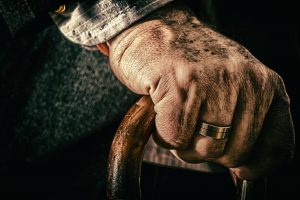
Essay: “My Father, Briefly” in Potato Soup Journal
My father, his parents, and all his siblings were born in England. None of them had a sense of humor. It might have helped.
Dad was the youngest of nine, emigrating to America with his mother and several of the older kids when he was 11. His father was inexplicably left behind. Not knowing the culture, she dressed him for school in what he wore in Cornwall—fussy Lord Fauntleroy suits. He was pummeled each morning until he convinced his mother to dress him in American clothing.
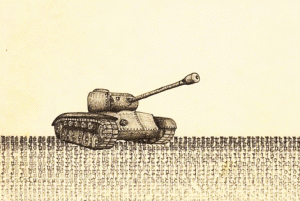
Three Short Fictional Stories: “Detachments” in BANG!
THE BITTER END
Thank you all for coming today. Russ would have appreciated it. I know you wish he were here to savor your lovely words. He would have basked in them.
We were married a long time. Two decades, in fact. Now we’re together, Russ, our last encounter. After we’re done here, they’ll haul you off to the crematorium. So, this is farewell, my friend. No one knew you and protected you like I did. This is my last chance to say my peace. I hope that’s what it will bring me.

Flash Fiction: “Instructions Upon My Death”
I would hope you’re reading this with tears streaming down your face, but I doubt it. Our relationship has not always been an easy one, volatile at times, distant at others. But never let it be said I didn’t love you. Very much. I don’t know how you feel about me. We don’t talk about such things, apparently. But now I’m about to die and there are some things you should know.
Book Review: Becoming Dr. Seuss by Brian Jay Jones in Fourth and Sycamore
His real name may not be as familiar as that of his alter ego, but after reading the informative book by Brian Jay Jones, the reader will be astounded at the bountiful course a single life can take. Becoming Dr. Seuss: Theodor Geisel and the Making of an American Imagination (Dutton, 2019) is about prolific writer Ted Geisel, for whom most everything he touched turned into greenbacks. He’s best known, of course, for his children’s books, written in clever rhyme, often professing a humanistic theme within the humor.
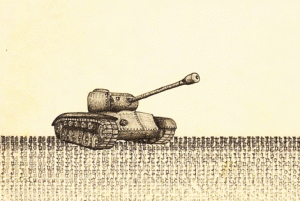
“Detachments:” Three flash-fiction stories in BANG!
THE FICTIONAL FATHER
I can’t remember how old I was when my mother told me my father was a rounder.
“What’s that?” I thought it had to do with baseball, a home-run hitter.
She looked off into the distance and lowered her voice. “He’s had affairs.”
I was old enough to know it was wrong.
My mind drifted back to the night Mom and I came home from the movies too early. Their bedroom door was closed. A few minutes later, Dad emerged in his boxers, his accordion strapped on his chest. I thought it odd; now, I realize he had been with someone who had escaped through the window.

“Ethel,” a short story in Literary Yard, August 4, 2019
As soon as she entered any room, Ethel Barrymore left little doubt she was royalty, or at least, its show business equivalent. That square jaw, the penetrating eyes, the erect carriage majestically leading the way. When she spoke, her sculpted, cultivated alto announced this was someone who would not tolerate any trifling.
Book Review: “A Personal Look at Flint:” What The Eyes Don’t See by Mona Hanna-Attisha
It was once unthinkable: government persistently and deliberately lying to cover its corruption, while injuring the most vulnerable among us. Sound familiar? Governmental dishonesty has always existed to some extent, though not as blatant as in recent years. In Mona Hanna-Attisha’s new book, What the Eyes Don’t See (One World, 2019), she implies the canary in the mine might have flown into Flint, Michigan.
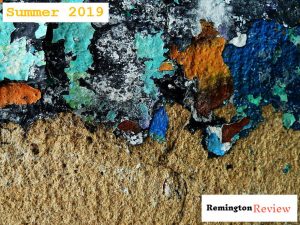
Essay: “Dead But Not Gone,” in Remington Review
Two nights in a row, I’ve dreamed about my mother’s death. More accurately, that she’s dead. She doesn’t make an appearance. In the first dream, I returned from a trip to find a phone message from my grandfather, telling me she had died early in November (this is April). The voice reeked with accusation, as if I should feel guilty because I wasn’t there. I had little reaction to the call and talked to my friend about all I had done for her before we left. Then, the second night, I dreamed I had come across a large mound of bills that were left unpaid after her death. I was trying to decide what to do if I ran out of money to pay them.
Book Review: “Until It’s Over:” The Art of Dying Well by Katy Butler
Any book about death and dying is actually about life and living. This axiom is echoed in Katy Butler’s The Art of Dying Well: A Practical Guide to a Good End of Life (Scribner, 2019). Her articulate book joins the spate of best-sellers on this theme, most recently Atul Gawande’s Being Mortal, Barbara Ehrenreich’s Natural Causes, and Paul Kalanithi’s When Breath Becomes Air. Butler offers step-by-step rules to follow as we march toward extinction, from building resilience in one’s 50s, to the end-stages of actively dying. Like taxes, death may be inevitable but it can be planful, allowing a near-orderly departure with no unfinished business.
Book Review: “Repeating History:” Camelot’s End by Jon Ward
Even if you’re not a political junkie, you can’t help but wonder how we got here. We’re a nation divided by persistent polemics, each side advocating different versions of reality. The election of 2016 was the obvious catalyst for our country’s overwrought political climate and pundits are still wondering how it all happened.
Essay: “A Writer Changed My Life” in The Manifest-Station
As a writer, I’ve been asked more than once: What book changed your life? My response is always the same: It wasn’t a book. It was a writer who never wrote a book. I wish I could say she was my hero but I barely knew her. Sometimes the most surprising act of kindness can transform a life.
Her name was Clara McClure and her family lived in a white clapboard house across the street from us on eucalyptus-lined Hartzell Street in then-middle-class Pacific Palisades.
Essay: “Making Movies” in Sad Girl Review
I sat near the back of the theater, having devoured my third Rolaid in ten minutes. Sitting around me were mostly strangers, people a generation or two younger, animatedly talking with one another. It made for a chaotic and noisy surrounding but I was lost inside my own silent thoughts. My first movie, which is to say, the first movie in which I had a role, was about to premiere at a theater in North Portland. The year: 1998. The film: “Birddog.”
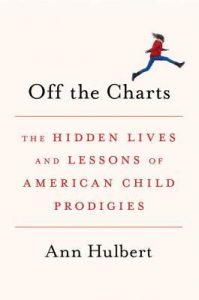
Book Review: Off the Charts by Ann Hulbert in Fourth and Sycamore
It’s Spring and for sports fans everywhere, that means it’s time to “Play ball!” What better time for a propitious new book about the colorful athlete whose name is reflexively associated with the Great American Pastime? Jane Leavy’s avowed purpose in The Big Fella: Babe Ruth and the World He Created (Harper, 2018) is to disinter the familiar myths and discover the boy who became the man.
Essay: “Talking Headaches” in Please See Me
I have a tumor inside my head. It’s not very big. It sits on the outer part of the brain itself, just to the left of center. It has a rhythmic, tongue-twisting name: meningioma.
I don’t know how long it has been in there but perhaps for decades, a permanent resident. When the physician informed me about this, I was not at all surprised and maybe even a little relieved.
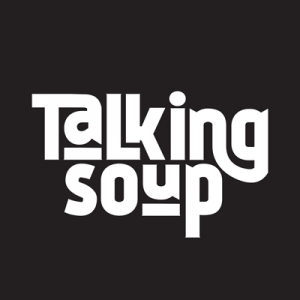
Essay: “Reclaiming a Dream”
When the weather turned cooler, I vowed to clean out the garage, an intermittent and tedious chore. There are a few things I never throw out—old music arrangements, my college portable typewriter, art, paint for retouching rooms in the house. And, most certainly, I am resolute when it comes to my darkened, weathered baseball mitt.
Book Review: “The Insufficient Brevity of Wit:” Wit’s End by James Geary, in Fourth and Sycamore
In contemporary social circles, one of the most onerous accusations is the absence of a sense of humor, an indirect reflection of one’s character. Yet, this acquired sensibility is not only idiosyncratic and personal but culture-based and subject to time and geography. In Wit’s End: What Wit Is, How It Works, and Why We Need It (WW Norton, 2018), James Geary has opted to explore humor’s socially elite cousin, the more esoteric and less commonplace verbal acrobatics called wit.

Essay: “The Resistant Cancer of Misogyny”
Longtime Speaker of the House Tip O’Neill famously said, “All politics is local.” But for me, all politics is personal, especially when discussing the circumscribed role and demonization of women in society. The current spate of misogyny, with its soaring rise in the public forum, has uncapped an ineptly sealed lid on the sexism that has always been dominant in our society.
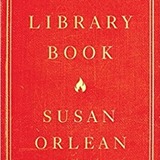
Book Review: “A Burning Desire,” The Library Book by Susan Orlean
It’s ironic that the subject for this review is a library, given this monthly offering appears in the Greenville Public Library literary magazine. So it’s easy to imagine the entire town of Greenville grieving if that austere public building burned in a massive fire—how it would affect everyone in its vicinity, how the community would gather to watch the inferno and how everyone would join together in the aftermath to rebuild.
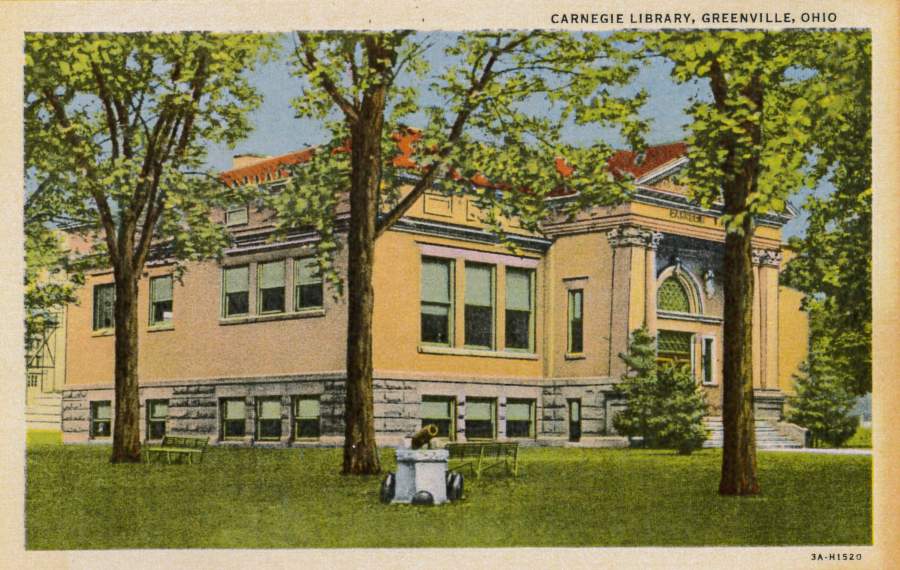
Interview with Pam Munter in Fourth and Sycamore
I recently had the privilege of interviewing Fourth & Sycamore’s very own Pam Munter about the release of her latest book, a memoir entitled, As Alone As I Want To Be.
Dear Miss Marshall,
I still dream about the band room at Paul Revere Junior High, even though more than sixty years have elapsed. I can see you now, sitting at the cluttered desk in your little office. The new school had just opened and my mother insisted I join the band, even though I had been playing the clarinet only a few months. I was thirteen and in the eighth grade, a porky, insecure, introverted kid. I needed someone who would take an interest in me and it turned out to be you.
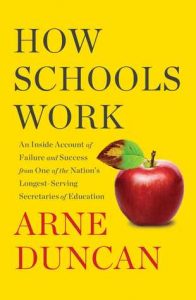

It’s not your average memoir. There’s no rape, murder, incest, abuse—the kind of catastrophic drama that sells books. I’m not crazy or neurotic. On top of those impediments, it’s written in a series of essays. There are through-lines, to be sure, but none of the usual name/rank/serial number kind of work so the reader can follow my life in that way. What will keep the reader engaged? Is growing up a feminist pioneer in a conventional society enough?
LINDA GLIDED ALONG THE SURFACE OF LIFE, like a bee checking out fragrant flowers, always in motion, never alighting for long. Our lives intersected only intermittently but at critical junctures. I missed a final opportunity, though. I found out this morning she died two months ago.
Our first meeting was over 50 years ago. It was in one of those godawful 8 a.m. seminars, an editing class at Cal in 1964. I was a senior journalism and political science major, writing a weekly TV and film review column for the Daily Californian. I was hunched over a news story when, out of the corner of my eye, I saw someone crouching next to me.
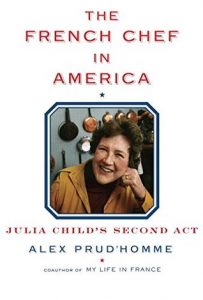
1. Hello Pam. How are you?
I’m fine, thanks. Hope you are, too.
2. How is the weather?Beautiful – in the 80s here today.
3.What time is it?
It was early afternoon when I began but early
morning the next day as I’m finishing it.
4. Are you busy with something?
This, fully engaged in the process.
(lots more)

Essay: Finding the Keys Again in Literary Yard
It’s easy to lose track of what matters in a life that’s busy and complicated. The process of reconnecting with the self and one’s passions sometimes can come from unexpected places. Like summer camp, for instance.
Though it’s referred to in the brochure as “a musical vacation,” SummerKeys in Lubec, Maine is a music camp for adults. The word “camp” merely serves as economical shorthand for other descriptive words such as workshops, seminars, practices and lessons. There is nothing campy about it.

It didn’t seem like that many years ago. World War I was raging but Hollywood was thriving, existing in a cocoon. Frances had come to the editing room at Biograph and found Mary alone. She was startled when Mary turned around, her petite frame dominated by her big blue eyes and long, curly blonde hair. “I know we’re going to be best friends,” Mary had said within minutes of their meeting. “I don’t have many friends,” she had confided.
Usually an afternoon walk to the mailbox is a mindless activity. I think about other things as I stroll to the end of the cul de sac to enter my key in the box, fourth one down on the left. Even as I do, I lament the loss of the daily home delivery that allowed a relationship, however impersonal, with the letter carrier. This day, I walked toward the box and saw a nearby garage door open, the house where I know people from Sri Lanka live. He sells small appliances and the garage is precipitously stacked with boxed goods. We’ve had some cordial conversations from time to time. The woman approached me with some urgency.
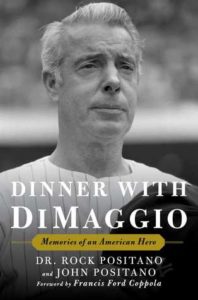
We both knew there was an issue with atypical dementia, stemming from multiple closed-head injuries in her youth. The diagnosis, describing a slow but progressive disease, had been confirmed by several neurologists.
Short Story: “Deconstructing Doris”
Note: As with most historical fiction, the people in this story are real. Many of the situations, however, are wholly imagined. This is one of the stories in a series that was inspired by the lives of Hollywood legends.
She was feeding the dogs in the cook’s kitchen when she heard the distinctive roar of his Porsche breaching the silence as it pulled up in the circular driveway in front of the contemporary house on Crescent Drive in Beverly Hills. She hurried to the front door, opened it and walked to the car to see Terry’s grim face.
I arrived early at the cemetery, just to be sure I was in the right place. The entrance was not well marked and there were no signs that said “Chapel.” I drove in past the many headstones to the only building on the premises. I walked in, accompanied by the resonance of my footsteps.
It’s probably politically incorrect to admit this, but I loved being a shrink. Much of the time, it was stimulating, challenging and, well, fun. For nearly 25 years, I was a clinical psychologist in private practice in a suburb of Portland, Oregon, seeing as many as 38 clients a week in 45-minute sessions. I haven’t done that in more than 20 years now, but hardly a day goes by that I don’t think about those years and all the people who invited me into their lives.
I was never much good at becoming a girl and I loathed every bit of the relentless indoctrination. Early family photos either show me looking uncomfortable in frilly girl’s clothing or smiling broadly while wearing my preferred dirty jeans and tee shirt. My mother offered to teach me to cook, but I had no interest. Sewing was completely a non-starter. I wanted to be outside, hitting a tennis ball against the wall or riding my bike around the neighborhood. When my mother decided I had earned too many Girl Scout merit badges, she refused to sew anymore on the sash “because it might hurt the other girls’ feelings.” When I was in the first grade, I wanted to be called Phil. An outlier at an early age.

surroundings. The school resembled an institution, dark, crowded and filled with the noise of kids yelling at each other. I felt anxiety nearly every day and even stopped eating breakfast due to an iffy stomach. The school seemed at least twice the size of my elementary school and I had to take a crowded bus for a half hour each way.
Book Review: Forgetting Who We Are: Memory’s Last Breath: Field Notes on my Dementia
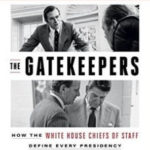
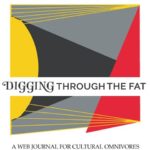
Escapism Literary Magazine: Fiction: “The Last Fan”
She used to be Joan Davis. Now she was just another 53-year-old has-been living behind tall, well- manicured hedges on Tamarisk Road in the Movie Colony in Palm Springs.


The whole thing had mattered too much, of course, as I knew it would.
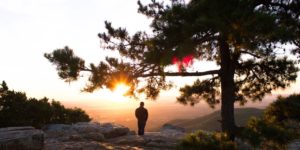
Dear Adam
NoiseMedium, December 14, 2016
Good afternoon. In your last email, you referred almost casually to having discussed suicide with your therapist. I know this is not a subject new or unfamiliar to you. You and I have talked about it several times before over the years, often under far more urgent circumstances. I appreciate your giving me permission to address this topic with you again, this time with seemingly more time to deliberate. And I value the trust. We’ve been friends a long time and…Continue Reading

Sinatra’s Mic
Angels Flight, July 28, 2016
How did I get here? I was standing in a Capitol Records recording studio holding Sinatra’s microphone in my hand.I had dreamed about doing this all my life but I never really thought it would happen. Still, it wasn’t totally unreasonable. I had already made many of my showbiz dreams come true over the years. I had appeared in a half-dozen films, had my own local television show, had been a disc jockey on the radio, was in a dozen or so commercials, and traveled all over the country singing in jazz clubs and cabaret rooms. There was just one thing missing. Continue Reading

Home
The Manifest-Station, August 18, 2016
It takes some planning to get into the correct lane for the right turn off busy Sunset Boulevard to Hartzell Street in Pacific Palisades but I’ve been doing it since I was 16 so it’s automatic for me – even now. Hartzell is one of the “alphabet streets,” part of a grid developed early in the history of the Palisades, all of which were named after the founding Protestant missionaries.
I haven’t lived there in more than a half century. But whenever I’m in the area, I feel an irresistible cosmic pull to make the pilgrimage to the house where so much of my childhood and adolescence unfolded, the repository of my earliest self. Now when I drive the four blocks up Hartzell to the house,…Continue Reading
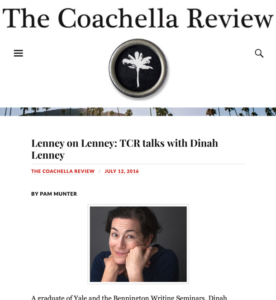
Lenney on Lenney
The Coachella Review, July 12, 2016
A graduate of Yale and the Bennington Writing Seminars, Dinah Lenney also trained at New York’s Neighborhood Playhouse School, home of the esteemed Sanford Meisner technique. Like writing, acting has taken her to myriad places—stage, screen and theater—allowing her to play a wide variety of roles.
Dinah has taught both acting and writing courses all over the country. She has also spoken at a TED conference at USC, a presentation integrating her interest in all the arts, “When Life Meets Art.” With Mary Lou Belli, she wrote Acting For Young Actors: The Ultimate Teen Guide.
And she has written two memoirs,…Continue Reading
Tribute to Noel Neill: A Celebration of Her Life
Metropolis, Illinois
November 5, 2016
She wasn’t always Lois Lane.
Noel arrived in Los Angeles from Minneapolis with her mother in 1938 and earned her living as a nightclub singer. She was 17 years old. Bing Crosby heard her and hired her for his club in Del Mar. It was a great time to be a singer. The legends of Tin Pan Alley were writing the music we’ve all come to know so well. The popular tunes of the day were written by Cole Porter, Irving Berlin, the Gershwins, Jerome Kern. Her favorite song, though, had been written in 1930, an early collaboration between Jimmy McHugh and Dorothy Fields: “Exactly Like You.” She put it on her song list whenever possible. Ironically, it wasn’t her singing that led to the movies. It was a fluke encounter with a horse. Continue Reading


